
What Is CBC And Why Is It Important?
CBC is one of 4 major cannabinoids produced by the cannabis plant. This compound isn't very well known among most cannabis enthusiasts, but science is starting to unveil its potential.
Cannabis is an extraordinarily chemically diverse plant. Its flowers produce various different types of terpenes, flavonoids, and cannabinoids, many of which have displayed medicinal potential within research settings. Cannabinoids are of particular interest and efficacy, with researchers now having identified over 100 of these compounds within the cannabis plant. THC and CBD are the most well known among this class of chemicals, however, many others are emerging into the spotlight as research mounts.
WHAT IS CBC?
Cannabichromene (CBC) is one such cannabinoid. Although much less well known, CBC has shown some significant medicinal potential within the limited research that has been conducted. Despite its low profile, CBC has been called one of the four major cannabinoids found within cannabis. The cannabinoid shares structural similarities with cannabinoids THC, THCV, CBD, and CBN.
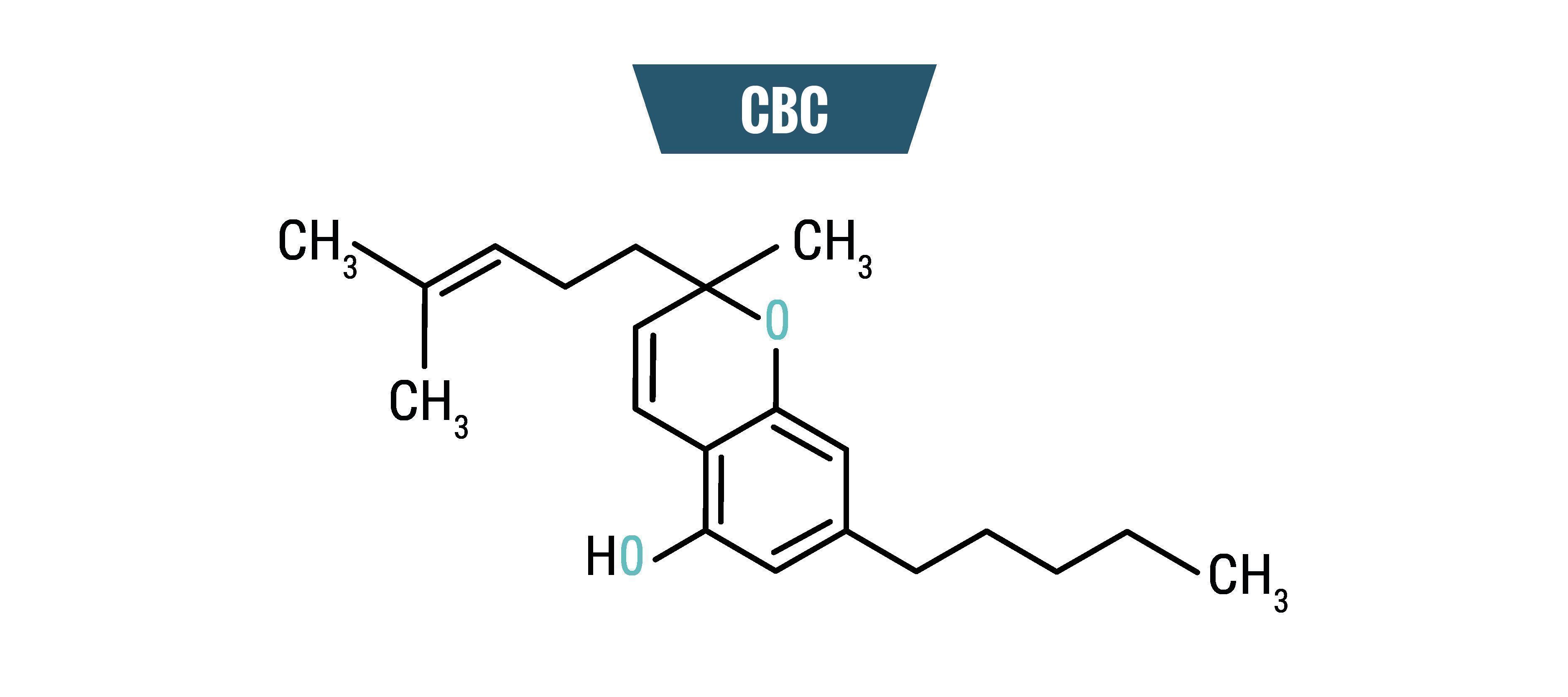
CBC is found in high concentrations within some Indian landrace strains. Most modern Western strains are not bred for CBC content, partly because this cannabinoid hasn’t gained much attention. Additionally, CBC is known to be quite delicate and degrades with ease into a cannabinoid called cannabicyclol (CBL) in the presence of heat and light.
BIOSYNTHESIS OF CBC
CBC also shares the same origins as THC and CBD. All of these cannabinoids begin life as the precursor cannabinoid cannabigerolic acid (CBGA). Enzymes within the plant convert CBGA into cannabichromene carboxylic acid (CBCA), which is then converted into CBC via heat and light exposure.
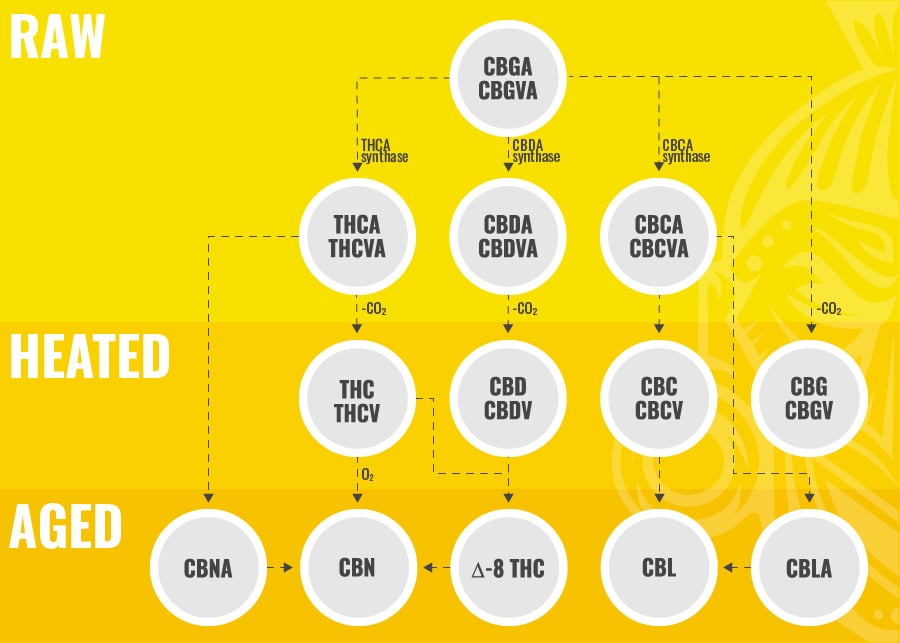
The cannabinoid THC achieves most of its effects by interfacing with receptors of the endocannabinoid system, namely CB1 and CB2 receptors. CBC, however, has a poor binding affinity to cannabinoid receptors, and instead achieves some of its effects via the vanilloid receptor 1 (TRPV1) and transient receptor potential ankyrin 1 (TRPA1).
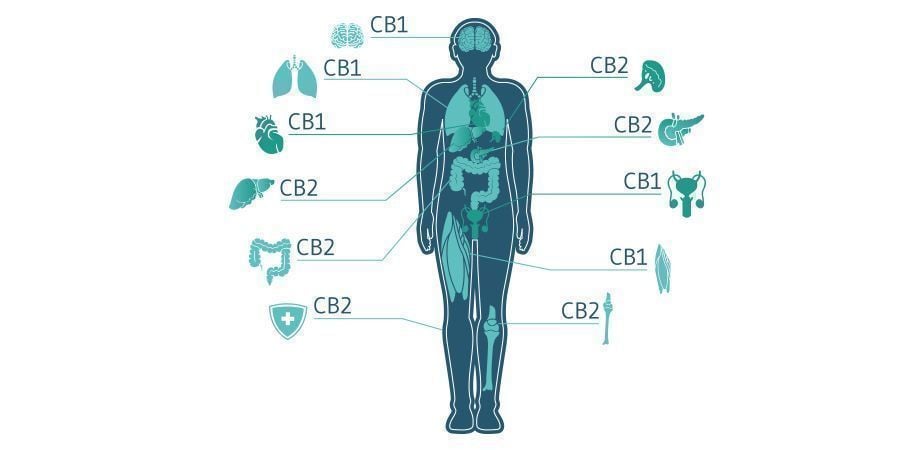
These receptors, otherwise known as transient receptor potential channels (TRP channels), are located on the plasma membrane of various cell types. They fulfill a mediating role in numerous bodily sensations such as pain, temperature, taste, pressure, and vision.
The action of CBC on TRP channels causes increases in levels of one of the body’s own cannabinoids: anandamide. Anandamide is structurally similar to THC, also interfaces with endocannabinoid receptors, and is associated with elevated mood and the “runner’s high”.
CURRENT SCIENTIFIC RESEARCH ON CBC
CBC isn't very well known among most cannabis enthusiasts, but science is starting to unveil its potential.
CBC HAS THE POTENTIAL TO WORK WITH OTHER CANNABINOIDS
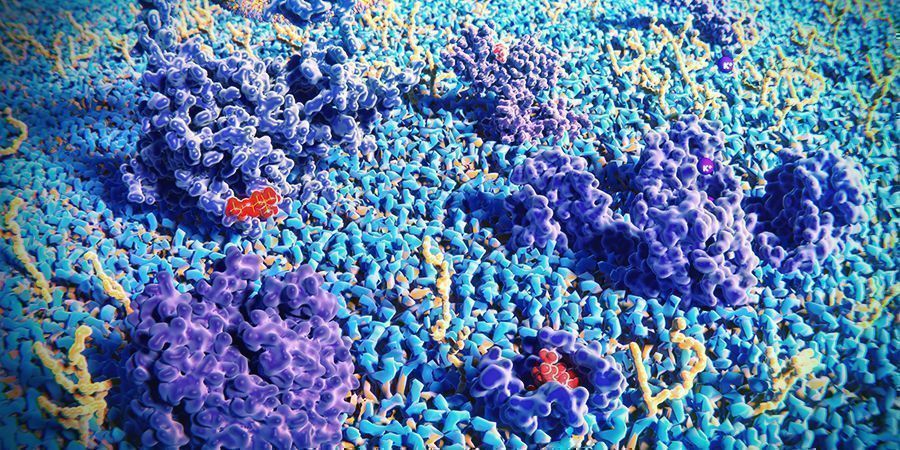
CBC may have the ability to work with other cannabinoids. Although research in this area is scarce, the so-called entourage effect has shown that certain terpenes and cannabinoids can work together in a synergistic manner to enhance overall effects. The ability of CBC to synergise with other cannabinoids is still unknown, but its potential medicinal effects make it likely.
CBC AND BRAIN FUNCTION

Neurological diseases such as Alzheimer’s are becoming more and more prevalent, highlighting the need to identify effective medications. CBC has shown some promise in this domain, with more clinical research needed to confirm its effects.
A 2013 in vitro study using mouse cells showed that CBC, among other cannabinoids, had the most profound positive effects on the viability of neural stem progenitor cells. These cells are crucial for brain plasticity under normal physiological conditions, as well as following brain injury.
These cells have the ability to differentiate into three other types of cells: astrocytes, neurons, and oligodendrocytes, with astrocytes being important in the physical and metabolic support of the brain. Astrocytes play an important role in brain homeostasis, however, they are also associated with Alzheimer’s disease pathology. CBC may help to prevent neural stem progenitor cells from differentiating into astrocytes, thereby achieving a pro-neurogenic effect.
CBC AND PAIN REDUCTION

CBC has been shown to reduce the activity of proteins involved in pain mechanisms. A 2011 paper published within the British Journal of Pharmacology tested the effects of both of these cannabinoids on pain on anaesthetised rats.
Researchers found that CBC had pain-reducing effects on the so-called tail flick-test. These cannabinoids achieved these effects via CB1, adenosine A1, and TRPA1 receptors. Both cannabinoids were found to significantly increase the quantities of endocannabinoids within the periaqueductal gray, the primary control centre for descending pain modulation. The researchers concluded that CBC may be a useful future therapeutic agent with multiple mechanisms of action.
CBC AND INFLAMMATION
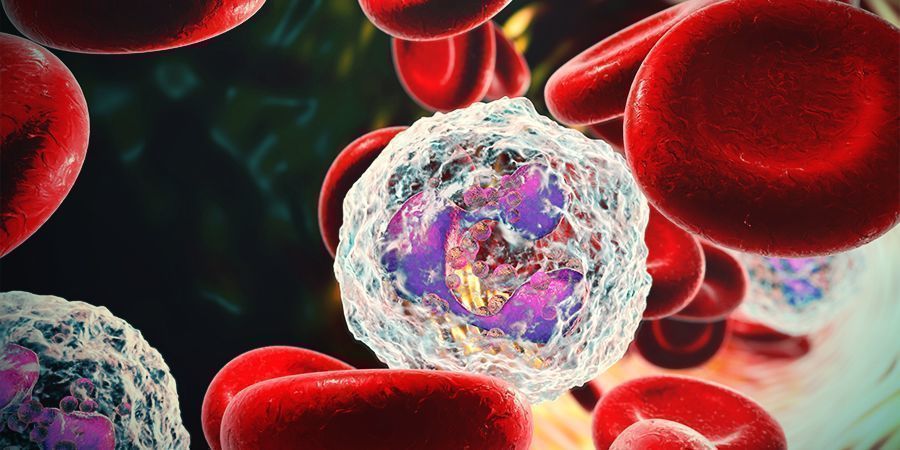
CBC appears to exert an anti-inflammatory effect. Inflammation is the body’s response to various pathogens, injuries, and medical conditions, and is associated with many diseases. Once again, research here is very preliminary, but CBC has been shown to reduce inflammation in some models. A 2011 paper published in the journal of Drug and Alcohol Dependance showed that CBC elicited a dose-dependent anti-inflammatory response in an animal model through a non-cannabinoid receptor mechanism of action. It was also found that these effects were enhanced when CBC was administered alongside THC.
CBC AND ACNE
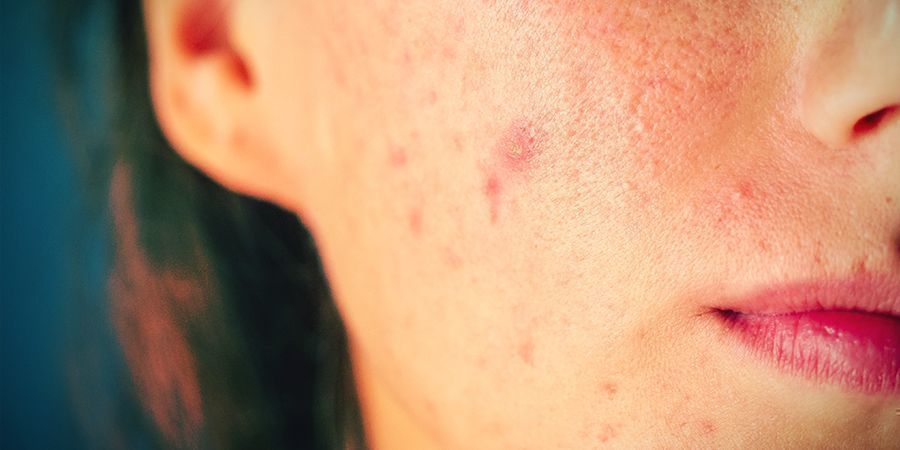
Acne is a common skin condition associated with increased levels of sebum production and inflammation of the sebaceous glands. A study published within the journal Experimental Dermatology tested the anti-acne effects of non-psychoactive cannabinoids. CBC was found to suppress sebaceous lipid production. These results prompted researchers to conclude that CBC, among other cannabinoids, shows promise in becoming a highly efficient anti-acne agent.
CBC AND LOW MOOD

Cannabis is well known to elevate mood, a trait often attributed to THC and CBD. However, CBC may also play a role in this domain. A study published within the journal Pharmacology, Biochemistry, and Behaviour showed that CBC achieved a significant antidepressant-like action in mice at doses of 20mg/kg and 200mg/kg. This suggests that CBC may also contribute toward the overall mood-elevating properties of cannabis.
- (n.d.). Error - Cookies Turned Off - https://bpspubs.onlinelibrary.wiley.com
- El-Alfy AT, Ivey K, Robinson K, Ahmed S, Radwan M, Slade D, Khan I, ElSohly M, & Ross S. (2010 Jun). Antidepressant-like effect of delta9-tetrahydrocannabinol and other cannabinoids isolated from Cannabis sativa L. - PubMed - NCBI - https://www.ncbi.nlm.nih.gov
- Gerald T. DeLong, Carl E. Wolf, Alphonse Poklis, & Aron H. Lichtman. (2010/11/11). Pharmacological Evaluation of the Natural Constituent of Cannabis Sativa, Cannabichromene and its Modulation by Δ9-Tetrahydrocannabinol - https://www.ncbi.nlm.nih.gov
- Maione S, Piscitelli F, Gatta L, Vita D, De Petrocellis L, Palazzo E, de Novellis V, & Di Marzo V. (2011 Feb). Non-psychoactive cannabinoids modulate the descending pathway of antinociception in anaesthetized rats through several mechanisms of action. - PubMed - NCBI - https://www.ncbi.nlm.nih.gov
- Oláh A, Markovics A, Szabó-Papp J, Szabó PT, Stott C, Zouboulis CC, & Bíró T. (2016 Sep). Differential effectiveness of selected non-psychotropic phytocannabinoids on human sebocyte functions implicates their introduction in dry/seborrho... - PubMed - NCBI - https://www.ncbi.nlm.nih.gov
- Shinjyo N, & Di Marzo V. (2013 Nov). The effect of cannabichromene on adult neural stem/progenitor cells. - PubMed - NCBI - https://www.ncbi.nlm.nih.gov
-
 5 min
29 August 2022
The Many Benefits Of Cannabis
There's no doubt that cannabis can provide a pretty outstanding high. But whether you're a casual user or someone with plenty of experience, cannabis can also offer up some benefits in the short...
5 min
29 August 2022
The Many Benefits Of Cannabis
There's no doubt that cannabis can provide a pretty outstanding high. But whether you're a casual user or someone with plenty of experience, cannabis can also offer up some benefits in the short...
-
 2 min
1 September 2020
What Is CBG And How Does It Compare To CBD?
Science is beginning to unveil the potential of many formerly untapped cannabinoids. CBG is one of them. How does this up-and-coming chemical compare to CBD?
2 min
1 September 2020
What Is CBG And How Does It Compare To CBD?
Science is beginning to unveil the potential of many formerly untapped cannabinoids. CBG is one of them. How does this up-and-coming chemical compare to CBD?
-
 3 min
15 January 2019
CBD Oil Benefits: Should You Use It?
CBD is fast becoming the star of the cannabinoid family. Taken in oil form, CBD is utilised for many purposes. Here's the scoop on why you should use CBD oil.
3 min
15 January 2019
CBD Oil Benefits: Should You Use It?
CBD is fast becoming the star of the cannabinoid family. Taken in oil form, CBD is utilised for many purposes. Here's the scoop on why you should use CBD oil.






 United States
United States











